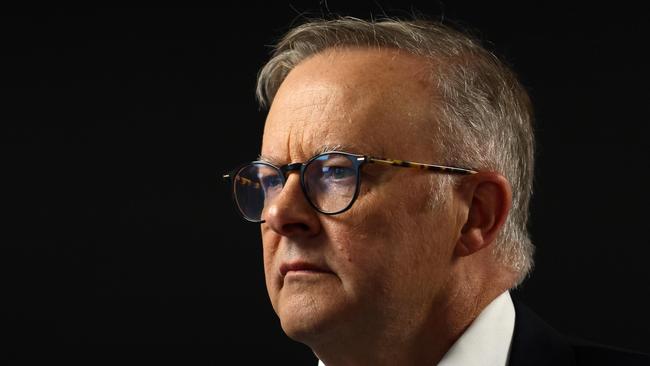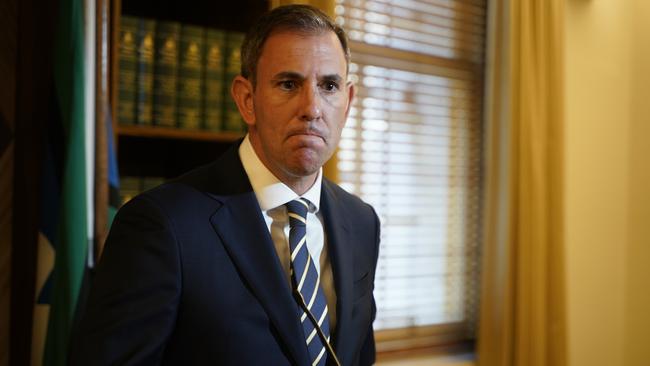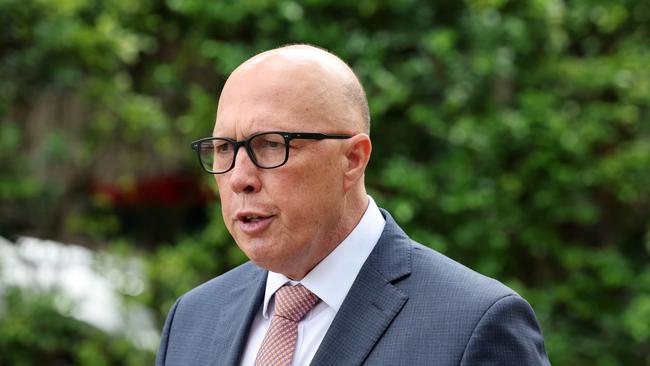Does Labor comprehend the extent of its vulnerability?
The opposition has the material for a devastating TV campaign that ruins Albanese’s credibility starting with his ‘my word is my bond’ pledge – anchored across the next election campaign.

Under this scenario only an inept government would stumble to election defeat in early 2025. This is not to dismiss the discontent in much of the Australian public from its recent inheritance. That discontent is pervasive – the loss of per capita income, falls in living standards, busted trust in the political class, self-serving elites pandering to minorities, and the difficulty of cutting through bureaucracies’ red and green tape to get things done.
Labor’s task is to settle an unsettled nation. The nation’s mood hovers around knife-edge equivocation. While core economic indicators are set to improve, giving Labor its electoral recovery opportunity, the damage to living standards, suspicion of the Albanese government and fears the country is on the wrong track, are potent warnings for Labor that things could go wrong.
The main news, however, is that Labor’s No.1 challenge – curbing high inflation – is showing tangible results.
Treasurer Jim Chalmers’ strategy for 2024 is taking shape. Inflation slowed to 4.1 per cent in the year to December 2023 from 5.4 per cent in September. The latest quarterly increase of 0.6 per cent is the lowest in four years. Inflation is now at its lowest level in two years. Most economists think the Reserve Bank’s interest rate cycle has peaked.
The Chalmers best-case scenario is known: that inflation falls to 2-3 per cent in 2024-25, that the cycle of negative real wages is decisively reversed, that falling interest rates help to restore confidence from later this year, and that the unemployment damage from the downturn is limited.
This week Chalmers said there was “welcome and encouraging progress” against inflation but “this is not mission accomplished”. Here is the context for Labor’s July 1 tax cuts. Anthony Albanese and Chalmers will present them as evidence of a strong economy giving back to deserving Australians – with 84 per cent of taxpayers getting higher tax cuts compared with the Coalition’s stage three that is about to be purged from the legislative books.

Albanese is exuding confidence. He is reverting to his 2022 election pose as Mr Compassion. Championing his tax cuts to combat cost-of-living pressures, Albanese invoked “the heroes of the pandemic” – the cleaners, the aged care workers, childcare workers, truck drivers and retail workers. Albanese’s tactic is to hold his base and the female vote and try to push further into the middle class vote.
Pivotal to his tactic is the big wedge against the Peter Dutton-led opposition. If Dutton votes against Labor’s tax revamp, Albanese will be gifted a devastating attack line: the opposition has voted against tax cuts for 13 million Australians, proving it is the party of perpetual negativity that puts ideology before people. The progressive media will accept this attack and run on it.
If Dutton votes for the Labor tax revamp, Albanese will say this disproves the “broken promise” claim mounted by the opposition – that if the opposition really believed its accusation then it couldn’t hypocritically vote to give effect to this “broken promise” policy.
As leader, Dutton has displayed great skill in the tactical decisions he has made. But he cannot afford a tactical blunder at this point. Voting against the tax cuts would be an extreme high risk. This is the trap Labor has set; it would be folly for the Coalition to fall into it. Such a decision would undermine the Liberal stance as the party of low tax. The Liberals must beware the false morality argument that voting against the tax cuts is somehow the “right” thing in principle because there is no such principle at stake.

Labor, meanwhile, is ramping up its attack in case the Coalition keeps Labor’s tax cuts but still honours stage three for people who have been punished by Labor. The government says the extra cost will be $38.9bn over four years and, unsurprisingly, Chalmers said this would “smash the budget, blow out the deficits, rack up more debt to give to the highest income earners and risk upward pressure on inflation”.
Got the picture? Labor thinks its tax revamp is a winner. Does Labor comprehend the extent of its vulnerability? The opposition has the material for a devastating TV campaign that ruins Albanese’s credibility starting with his “my word is my bond” pledge – anchored across the next election campaign.
Albanese’s image is compromised. The PM misled the nation on the voice, saying it was a safe proposal. He misled the nation on stage three tax cuts. What might come next? Anyone who recalls Bill Shorten’s successful 2016 Medibank scare campaign knows the potential for a Liberal Party scare. The stage is set.
This is what makes the events of the past fortnight so dispiriting. Australia is heading into a backward-looking brawl over tax at the next election – essentially about the merit of Scott Morrison’s tax policy from five years ago. You call this national progress? Labor wants to discredit the Liberals for favouring high-income earners, while the Liberals want to run a scare on what Labor will do with everything from negative gearing to capital gains to more superannuation taxes.
This is regressive politics. Every omen points to an election dominated by the power of the negative, by scares, by an equity and envy slog, by short-term politics devoid of long-run tax reform. In short, by a re-run of the malaise that has weakened Australia’s performance for the past 18 years. This scenario guarantees even deeper voter disenchantment.
The highly sensitive tax conflict between Labor and the Coalition – now on graphic display – needs an intermediating process to open fresh options. There should be a tax summit, perhaps drawing upon the summit hosted by The Australian and The Australian Financial Review in 2015 that was open-ended, without prior positions and had prospects of breaking down the tax stalemate.
Labor’s tax revamp makes minor concessions to reform but is best seen overall as driven by politics, by Labor’s quest to prove to the public it cares, really cares, about their cost-of-living pain. This policy, above all, was about finding a cause and a fight for Albanese – an instrument to rally his weakening position with middle class voters.
It is not about the national interest tax reform that Australia needs. It entrenches our excessive reliance on personal income tax for revenue. It is old-style ALP re-distributional politics. It says that in order to reward people earning below $146,000 it is essential to punish those earning above $146,000. By injecting the 37 per cent rate at $135,000 it makes more middle-class taxpayers subject to bracket creep. It undermines aspiration and makes income taxes even more dependent on the top 15 per cent of taxpayers. It has the top marginal rate kicking in at $190,000, absurdly low compared with a range of OECD nations.
The package comes with the apparent determination of the Albanese government not to broaden the GST and with Chalmers saying Labor is “not contemplating” other areas such a negative gearing, the capital gains tax discount and franking credits.
Labor seems to dismiss the tax reform agenda wanted by advocates from both the right and the left. Neither seems to be getting a guernsey. On tax, what Labor does and what Labor refuses to do seems driven by a narrow, politically shaped lens, seeking majority support, but ultra-cautious about anything that risks bold reform.
As for the Coalition, its mistake is to think the coming tax debate is about restoring stage three. Again, that is rear-view stuff. The opposition needs to begin with a fresh page. It needs to take an entirely new tax policy to the next election that is fit for purpose. Making the restoration of stage three its central purpose would be a blunder.
The grave, almost inevitable risk now is that Albanese’s broken promise on stage three makes further reform even more difficult. It is extraordinary that Chalmers and Finance Minister Katy Gallagher, in denying any plans to alter negative gearing and capital gains, use the identical language they deployed for so long in denying any change to stage three. They virtually write Dutton’s script.
The Albanese-Dutton leadership brawl will be bitter, a replay of Albanese-Morrison with the Liberals fully aware of how Albanese campaigned successfully against Morrison’s character. Just watch Dutton on this front. He says Albanese lied about changing stage three and asks why anyone should believe his denials about negative gearing or capital gains when Labor is using the same language. Albanese’s pitch, Dutton says, “is an attack on aspiration, pitching one Australian against the other”. He broadens that economic assault to a cultural assault – witness Australia Day – saying the Prime Minister lacks “the guts to stand up for our national day and call out the woke CEOs”, preferring instead to walk “both sides of the road” and telling everybody “what they want to hear”.
Labor should not misjudge the extent to which its tax cuts will mollify the Australian middle class. Indeed, this could become Labor’s trap. The reality of income attrition has been entrenched for years, excluding the pandemic. GDP per capita calculations by independent economist Saul Eslake shows average annual GDP growth per capita declined to only 0.9 per cent during the Coalition era – just one third of the growth from the previous generation.
Late last year economist Chris Richardson said: “There’s been a huge drop in our standard of living. It’s down almost 10 per cent since the artificial high from the extra money we got from the Covid-driven September 2021 peak. This is a much bigger fall in living standards than we have seen in any recession in living memory.”
This constitutes a combination of both long-run trends and exit from the pandemic support. Opposition Treasury spokesman Angus Taylor said this week that real net disposable income per person had fallen by 8.6 per cent over the past 18 months. He said there was a decline in take-home pay of just under $8000 for an average income earner with rising mortgage payments, failing real wages and increasing income taxes vital factors.
The public deserves a better debate about tax and the need for tax reform. As the inflation battle is gradually won, the election agenda during 2024 should be transformed – it needs to move from beating inflation to reviving long-run economic growth.
Chalmers often said Australia cannot just revert to its pre-pandemic economic norm. Exactly. But where are the policies to rekindle a superior growth and productivity strategy?
If Labor cannot deliver that agenda, it won’t be a long-term government. For too long the Australian political class – and much elite opinion – has put economic reform on the back burner. This has fed into the policy and culture debate like a spreading cancer, the upshot being chronic conflict over the economy, rising populism, parliamentary gridlock, and a sullen public resistant to change and fixated on “how someone is ripping me off” rather than a rising tide that lifts all boats.
Recent analysis from Deloitte Access Economics partner and economist Stephen Smith, in this week’s Business Outlook, reinforces arguments about the burden the Australian public has sustained and the need for reform to drive a growth strategy.
Smith said when the emergency support from Covid was withdrawn and population growth via immigration was restored, real household disposable income per head declined in “a total peak-to-trough fall of almost 9 per cent”. He said: “In fact, real household disposable income per capita is expected to remain below the trend seen between the 2008 financial crisis and the pandemic for at least the next five years.”
This should warn Labor. Its tax cut of $16 extra a week for a taxpayer on average earnings is minor compared with the diminished disposable income after the interest rate and income tax increases. Does Labor get a voting reward? Maybe, but maybe not. People will take the cash but might decide they don’t trust Albanese.
Smith said: “The outlook for growth in the Australian economy is modest at best. If realised, and excluding the pandemic period, the forecast growth of 1.3 per cent in calendar year 2024 would be the weakest since the early 1990s recession. That will likely mean that by the end of 2024 the primary economic challenge for the country will not be lowering the rate of inflation, it will be lifting the rate of growth.”
That’s the call. But lifting economic growth and living standards will need a lot more than anything Labor has produced so far.




The economic planets are moving into alignment for the Albanese government. There are no guarantees but the outlook is for interest rate cuts later this year, a second budget surplus, rising real wages and higher tax cuts from July for all workers under $146,000.